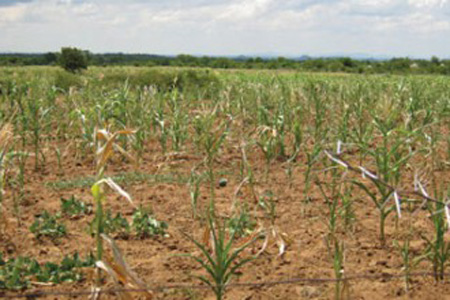
Drought-induced hunger is stalking Matabeleland South, with reports that villagers in areas such as Matobo are going without proper meals following poor harvests.
BY NQOBANI NDLOVU
According to a government crop assessment report, Matabeleland South requires nearly 61 000 tonnes of grain to avoid widespread hunger-induced deaths.
In September, Agriculture, Mechanisation and Irrigation Development minister, Joseph Made, said government was distributing the 700 000 tonnes of grain it imported to hungry communities across the country.
Made said there were two categories of beneficiaries — the vulnerable that would get vouchers from the Department of Social Welfare to access the grain and others who would be asked to buy at subsidised prices.
However, villagers in Matobo told The Standard they were yet to receive the promised government grain, and appealed for urgent food aid to prevent hunger-related illnesses and deaths.
“We survive on begging from those who are lucky to have their children working in neighbouring South Africa. The situation is bad, and government should urgently come in and assist,” said Donald Moyo in Matobo last week.
Villagers’ livestock is also at risk owing to lack of pastures, said Herman Ncube, the headmen for Sigangatsha area, Ward 6 in Matobo.
- Chamisa under fire over US$120K donation
- Mavhunga puts DeMbare into Chibuku quarterfinals
- Pension funds bet on Cabora Bassa oilfields
- Councils defy govt fire tender directive
Keep Reading
Government has urged villagers to destock to avoid losses due to cattle deaths as a result of drought.
But destocking is a painful exercise for many who prefer to see their herds multiply rather than selling them for cash, a situation that has seen some lose everything when drought strikes and their cattle die.
Cattle are a status symbol, a source of pride in rural areas such that one’s standing and respect in society is measured by how big their kraal is.
“Villagers face hunger and on top of that, they are losing their livestock due to lack of pastures. The food is there in the shops but many here do not have the money to buy, and the situation is made a lot worse by the US$-rand cross rate,” Ncube said.
“Villagers have rands but with the fall of the rand, the mealie-meal becomes unaffordable here at the shops. Government should assist.”
Chief Malaba weighed in, saying had it not been for the food for work programmes and the intervention of non-governmental organisations, the situation would have been a lot worse, with hunger-induced deaths being reported. “NGO’s have been coming now and then to assist. The food for work programmes have also been of help, but all this is not enough if we look at the food requirements. Already, some villagers are now losing cattle due to lack of pastures,” said Malaba on Wednesday during a visit to the area.
On Wednesday, confectionary company Bakers Inn donated food hampers comprising a 50kg bag of mealie-meal, 10kg sugar, 5kg flour, sugar beans, kapenta, bread, cooking oil, bath and washing soaps and other goodies totalling over $30 000 to about 150 families in wards 4, 5 and 6 under Malaba.
Reports say about 300 cattle deaths have been reported in Matabeleland South as a result of drought. It is estimated that more than 350 000 cattle could die if no intervention measures are taken.











